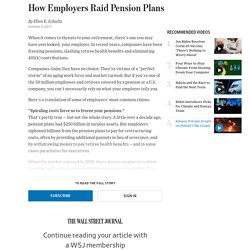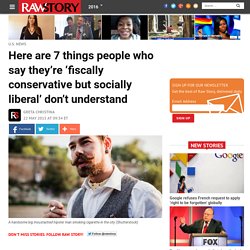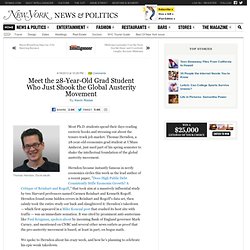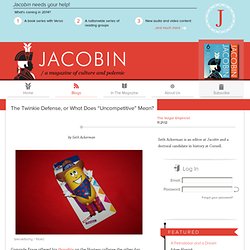

How Employers Raid Pension Plans. When it comes to threats to your retirement, there's one you may have overlooked: your employer.

In recent years, companies have been freezing pensions, slashing retiree health benefits and eliminating 401(k) contributions. Companies claim they have no choice: They're victims of a "perfect storm" of an aging work force and market turmoil. But if you're one of the 50 million employees and retirees covered by a pension at a U.S. company, you can't necessarily rely on what your employer tells you. Here's a translation of some of employers' most common claims: "Spiraling costs force us to freeze your pensions. " When the market cratered in 2008, there was no surplus to cushion the blow, and today, pensions collectively are underfunded by 20%. Paramedic’s Angry Post About "Burger Flippers" Making $15/hr Goes Viral.
Here are 7 things people who say they’re ‘fiscally conservative but socially liberal’ don’t understand. A handsome big moustached hipster man smoking cigarette in the city (Shutterstock) “Well, I’m conservative, but I’m not one of those racist, homophobic, dripping-with-hate Tea Party bigots!

I’m pro-choice! I’m pro-same-sex-marriage! I’m not a racist! I just want lower taxes, and smaller government, and less government regulation of business. How many liberals and progressives have heard this? And it’s wrong. You can’t separate fiscal issues from social issues. 1: Poverty, and the cycle of poverty. If you’re poor, there’s about a two in three chance that you’re going to stay poor for at least a year, about a two in three chance that if you do pull out of poverty you’ll be poor again within five years — and about a two in three chance that your children are going to be poor.
Also, ironically, being poor is expensive. Second chances, once considered a hallmark of American culture and identity, have become a luxury. Plus, being poor doesn’t just mean you’re likely to stay poor. Now. Qualtrics Survey Software. Grad Student Who Shook Global Austerity Movement. Thomas Herndon, Excel sleuth.

Most Ph.D. students spend their days reading esoteric books and stressing out about the tenure-track job market. Thomas Herndon, a 28-year-old economics grad student at UMass Amherst, just used part of his spring semester to shake the intellectual foundation of the global austerity movement. Herndon became instantly famous in nerdy economics circles this week as the lead author of a recent paper, "Does High Public Debt Consistently Stifle Economic Growth?
A Critique of Reinhart and Rogoff," that took aim at a massively influential study by two Harvard professors named Carmen Reinhart and Kenneth Rogoff. Herndon found some hidden errors in Reinhart and Rogoff's data set, then calmly took the entire study out back and slaughtered it. We spoke to Herndon about his crazy week, and how he's planning to celebrate his epic wonk takedown. "This week has been quite the week," Herndon told us in a phone call from UMass Amherst's campus. Herndon was stunned. The Twinkie Defense, or What Does “Uncompetitive” Mean? (verokitschy / flickr) Comrade Frase offered his thoughts on the Hostess collapse the other day, and while I have my differences with his take, that’s not what I want to talk about here.

What fascinates me about the the bakery workers’ strike are all the reactions to it, and what they reveal about the worldview underlying our free market in labor. On Twitter a while ago, some neoliberal creep who works for Bloomberg News lamented that New York’s transit system would be so much better off if the workers’ pay levels weren’t so “uncompetitive.” Meanwhile, every time a Wal-Mart flak goes on TV to talk about the company’s labor problems, they’re always at pains to insist that their stores pay “competitive wages.”
So goes the rhetoric of market competition: for Wal-Mart, competitiveness means wages that are high enough; for the MTA it means wages that aren’t low enough. Let’s ask Hostess. Most of the subsequent commentary blamed the union, of course. So let’s turn back to hapless Hostess.